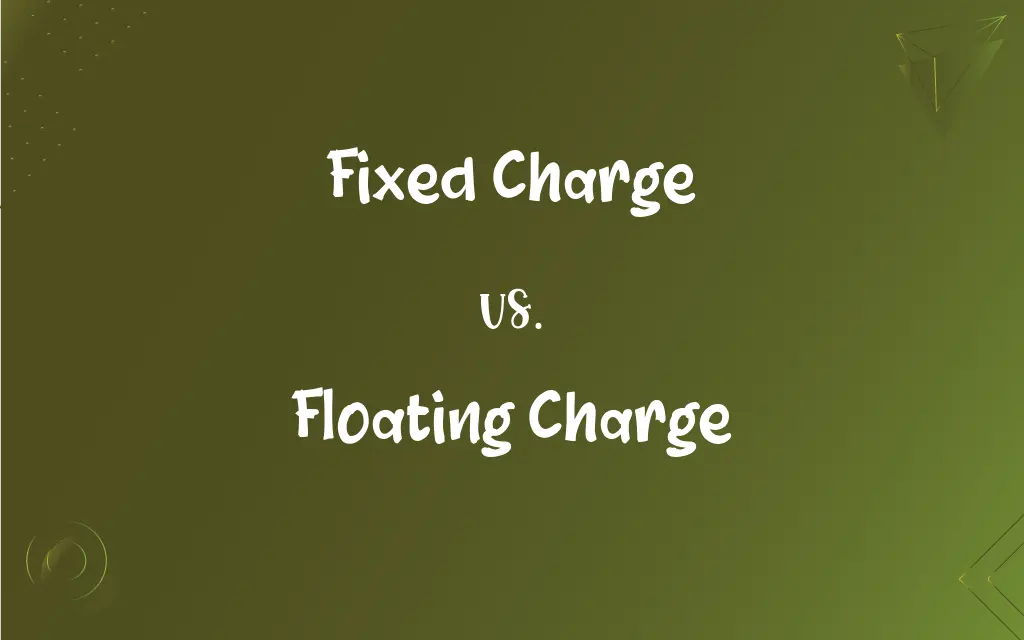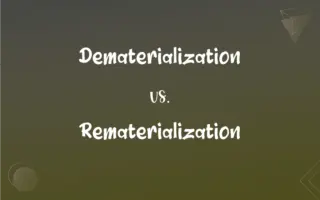Fixed Charge vs. Floating Charge: What's the Difference?
Edited by Aimie Carlson || By Janet White || Published on November 5, 2023
Fixed Charge relates to specific assets, remaining constant over them, while Floating Charge is broader, covering present and future assets, becoming 'fixed' upon a certain event.

Key Differences
Fixed Charge is a security interest or lien over specific, identifiable assets, meaning those assets cannot be sold without the lender's consent. In contrast, Floating Charge is an overarching lien on assets that aren't specifically identified, granting companies flexibility in using those assets until an event crystallizes the charge.
With Fixed Charge, lenders have a direct claim over the assets they're secured against, ensuring a high level of security. On the other hand, Floating Charge covers general assets that might vary over time, such as inventory or receivables, offering businesses operational agility.
While assets under Fixed Charge remain consistently dedicated as collateral for a loan, assets under Floating Charge keep changing in nature and value. For instance, as inventory gets sold and restocked, the underlying assets for the charge fluctuate.
Companies adopting Fixed Charge cannot freely sell or dispose of the secured assets without the lender's consent or without settling the charge. In the Floating Charge scenario, companies can continue dealing with the assets until the charge becomes fixed, usually upon default or another triggering event.
In cases of borrower bankruptcy or liquidation, Fixed Charge holders are prioritized, having a direct claim to the specific assets. Floating Charge holders, however, are further down the hierarchy, receiving what remains after other creditors are satisfied.
ADVERTISEMENT
Comparison Chart
Nature of Charge
Specific and constant over identifiable assets.
General and overarching, becomes specific upon event.
Asset Identification
Directly linked to particular assets.
Covers a range of changing assets, like inventory.
Operational Flexibility
Assets can't be sold without lender's permission.
Assets can be dealt with freely until crystallization.
Crystallization Trigger
Not applicable as it's always fixed.
Occurs upon certain events like default.
Priority in Liquidation
High priority as they have a direct claim.
Lower than fixed charge, satisfied after specific creditors.
ADVERTISEMENT
Fixed Charge and Floating Charge Definitions
Fixed Charge
It offers lenders a consistent collateral security.
The Fixed Charge on machinery ensures the lender can claim it if the borrower defaults.
Floating Charge
It covers assets that vary in nature and value.
As a company's debtor list changes, it remains under the Floating Charge.
Fixed Charge
Fixed Charge remains unaffected by operational fluctuations.
Even if the company's fortunes change, the Fixed Charge on its headquarters remains.
Floating Charge
Floating Charge provides operational flexibility.
Under a Floating Charge, a firm can sell and replenish stock without seeking lender consent.
Fixed Charge
Fixed Charge restricts the disposal of the secured asset.
Under a Fixed Charge, a company can't sell its building without the bank's approval.
Floating Charge
Floating Charge is a lien over a changing set of assets.
A company secures a loan with a Floating Charge on its inventory.
Fixed Charge
It provides lenders a high level of security.
Creditors prefer Fixed Charge as it assures them specific asset recourse.
Floating Charge
It crystallizes or becomes 'fixed' upon specific triggering events.
If the company defaults, the Floating Charge on receivables might become fixed.
Fixed Charge
Fixed Charge is a lien over specific and identifiable assets.
A mortgage on a property is a form of Fixed Charge.
Floating Charge
Floating Charge holders have lower priority during liquidation.
If the firm goes bankrupt, Floating Charge creditors claim only after fixed ones.
FAQs
What assets does a Fixed Charge cover?
Specific, identifiable assets like property or machinery.
Can an asset be under both Fixed and Floating Charge?
Typically, an asset can't simultaneously be under both, but sequential charges might apply.
Can a company operate freely under a Floating Charge?
Yes, until the Floating Charge crystallizes or becomes fixed.
How does a Floating Charge become 'fixed'?
Through events like borrower default or insolvency.
Can a Fixed Charge asset be sold?
Only with the lender's consent or after settling the charge.
Is a Floating Charge riskier for lenders?
Generally, due to its lower claim priority and asset variability.
Which charge provides more security to lenders?
Fixed Charge, due to its direct claim over specific assets.
Are Fixed Charge holders prioritized in liquidations?
Yes, they claim their specific assets before Floating Charge holders.
How does a Fixed Charge affect a company's operations?
It limits the disposal or sale of the specific secured assets.
Can a Floating Charge cover future assets?
Yes, it can extend to assets acquired after the charge creation.
Are all assets suitable for a Fixed Charge?
No, only specific, identifiable ones.
Are mortgages a form of Fixed Charge?
Yes, as they're specific liens on properties.
What assets are typically under a Floating Charge?
Changing assets like inventory, accounts receivable, and cash.
Why might companies prefer Floating Charges?
They offer operational flexibility, allowing asset dealings without constant lender consultation.
How do charges impact a company's creditworthiness?
They can signal the firm's debt levels and risk to potential lenders.
What happens when a Floating Charge crystallizes?
It becomes fixed, pinpointing specific assets as collateral.
Can Floating Charges cover intangible assets?
Yes, like intellectual property or goodwill.
Can a Floating Charge be on a single category of assets?
Yes, like only on inventory or only on receivables.
Which is more common, Fixed or Floating Charge?
It varies based on lending needs and business operations.
How do Floating Charges affect a company's liquidity?
They generally don't restrict asset disposal, aiding liquidity.
About Author
Written by
Janet WhiteJanet White has been an esteemed writer and blogger for Difference Wiki. Holding a Master's degree in Science and Medical Journalism from the prestigious Boston University, she has consistently demonstrated her expertise and passion for her field. When she's not immersed in her work, Janet relishes her time exercising, delving into a good book, and cherishing moments with friends and family.
Edited by
Aimie CarlsonAimie Carlson, holding a master's degree in English literature, is a fervent English language enthusiast. She lends her writing talents to Difference Wiki, a prominent website that specializes in comparisons, offering readers insightful analyses that both captivate and inform.






































































